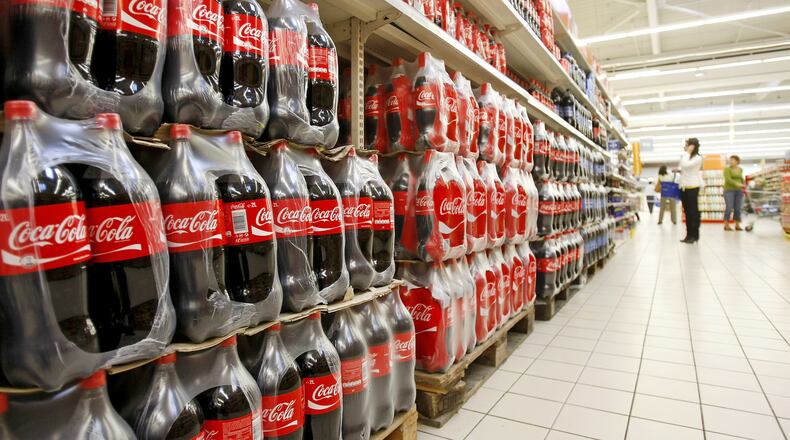Coca-Cola, the top contributor to global plastic pollution among major brands, is retreating from previous goals it set to reduce plastic waste and greenhouse gas emissions.
The Atlanta-based company, which does business in nearly every country on Earth, cast the change as an “evolution” of its voluntary environmental goals informed by decades of work in sustainability. Environmental groups slammed the decision to abandon goals they said were already weak in favor of vague platitudes about recycling.
Trash audits carried out by environmental groups have found Coca-Cola to be the top plastics polluter in the world for several years running, and the company has been the target of sustained activist campaigns and lawsuits.
In recent years, Coke set a goal to reduce its use of virgin plastic by 3 million metric tons from 2020 to 2025. It set goals of collecting and recycling one bottle or can for each one it sells, using at least 50% recycled content in its packaging and selling at least 25% of its beverages in returnable, refillable containers by 2030.
The company also said it would reduce its planet-warming greenhouse gas emissions by 25% by 2030.
In its new plan, the company has done away with its goal of reducing its use of virgin plastic in packaging and lowered its recycling targets. It also abandoned its emissions goal.
The company now says it aims to reduce its emissions “in line with” the Paris Agreement goal of limiting global warming to 1.5 degrees Celsius (2.7 degrees Fahrenheit), but does not give a percentage reduction or other quantifiable numeric threshold.
Credit: Seeger Gray / AJC
Credit: Seeger Gray / AJC
A spokesperson for Coca-Cola said the company was tackling “complex, challenging” societal problems that require cooperation between the industry, the government and the public.
“(T)o help deliver on our progress, we need more time and more focused resource allocation,” the spokesperson said.
Susan Graff is a professor of practice at Georgia Tech and a consultant who has worked with Fortune 500 companies on their sustainability policies and environmental management systems.
She said while it was reasonable to reset goals based on shifts in the global market, large companies like Coca-Cola need to take responsibility for their packaging supply chains, including recyclers. She said the same applied to the company’s emissions goals, which went from a hard number to a more amorphous pledge from the company to do its part.
“I would encourage companies like Coca-Cola to hold true to what they set out to do,” Graff said. “Stick to your guns; be ambitious; be transparent about why you’re not making progress.”
Otherwise, she warned, the company could lose the trust of consumers and the broader public.
Coca-Cola reported $35.5 billion in revenue during the first nine months of 2024, and a net profit of $8.4 billion.
Matt Littlejohn of the conservation advocacy organization Oceana, called Coca-Cola’s decision to abandon its prior goals “incredibly disappointing” and “cynical.”
“It was hard, so they just walked away from it,” he said.
He noted the company made the announcement Dec. 2, just after the collapse of negotiations for the first legally-binding global treaty on plastic pollution under the auspices of the United Nations in Busan, South Korea. Negotiations are set to continue next year.
News reports said a minority of oil-producing states, including the countries of Saudi Arabia and Russia, blocked progress toward an agreement over proposed production limits. Plastic is derived from oil-based petrochemicals, which have become the key driver of global oil demand growth, according to the International Energy Agency.
Discarded plastics often end up in waterways and landfills. Much of this plastic waste is not biodegradable, though some of it breaks into smaller pieces and ends up being ingested by fish and other wildlife.
Dianna Cohen, co-founder and CEO of the Plastic Pollution Coalition, said in a statement that advocates have been urging Coca-Cola for years to bring back refillable containers, like the iconic glass Coke bottles it collected at high rates for years before switching to mostly single-use bottles and cans. She took the company to task for axing its goal related to refillable containers.
Instead, she said the company is “doubling down on plastic ‘recycling,’ which is not living up to its promises and is making the plastic pollution crisis worse.”
“The Coca-Cola Company has spent years systematically dismantling bottle bills and fighting bottle deposit legislation in the U.S. and around the world,” Cohen said. “With evidence piling up that plastic poisons people, and with microplastics invading all parts of the planet and our bodies, it’s long past time for Coca-Cola to use their record profits to invest in reuse systems and plastic-free regenerative materials.”
Duane Stanford, editor and publisher of Beverage-Digest, said publicly traded companies like Coca-Cola are under pressure to show progress on environmental metrics while also pleasing shareholders, leading to a “mishmash of attempts” in a murky landscape.
He said he was curious to see if the impact of new climate risk disclosure regulations from the Securities and Exchange Commission — currently on hold pending legal challenges — could impact that landscape by requiring companies to put a number on their investments in climate mitigation.
“What are you spending on the problem,” he said. “That’s a bottom line way to measure.”
The state of Georgia and the U.S. Chamber of Commerce, of which Coca-Cola is a member, have both filed legal challenges to the new climate disclosures.
Note of disclosure
This coverage is supported by a partnership with Green South Foundation and Journalism Funding Partners. You can learn more and support our climate reporting by donating at ajc.com/donate/climate.
About the Author







